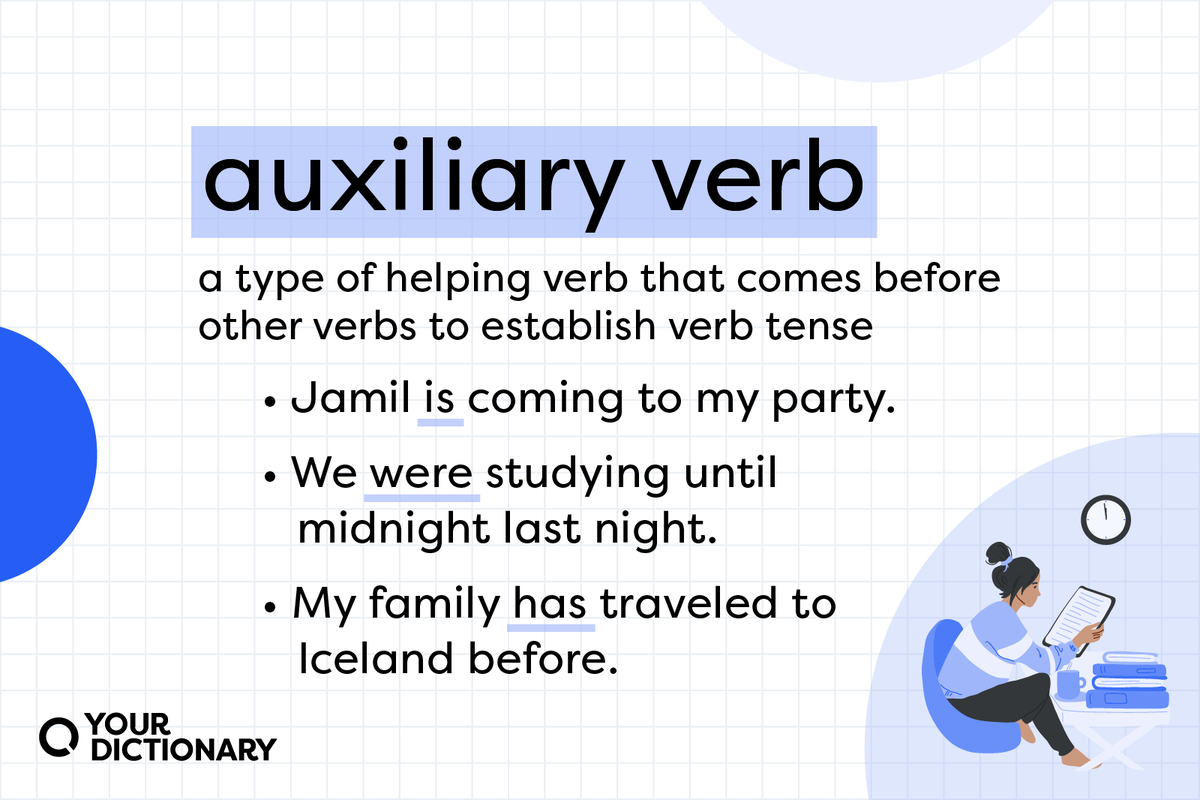
Auxiliary is a big word to describe small verbs. But without them, you’d never know if Carl is fishing, if Carl was fishing, if Carl has fished, or even if Carl does fish at all. So what are auxiliary verbs, and why do basically all of grammar conjugation rules depend on them?
What Is an Auxiliary Verb?
Auxiliary verbs are a type of helping verb that establish verb tense. Unlike action verbs, auxiliary verbs aren’t the only verb in the sentence. They always accompany other verbs.
The three main auxiliary verbs — the forms of be, have, and do — come before verbs to show different verb tenses.
- Jamil is coming to my party.
- We were studying until midnight last night.
- My family has traveled to Iceland before.
- Oliver had been driving for six hours.
- I did vote for him in the last election.
Depending on which auxiliary verb you use, you can create the progressive aspect to show current actions or the perfect aspect to show actions that are already finished.
Conjugating the Three Main Auxiliary Verbs
You’ll find be, have, and do in their conjugated forms to form different verb tenses.
|
Forms of “Be” |
Form of “Have” |
Forms of “Do” |
|
be/being |
have |
do |
|
am/is/are |
has |
does |
|
was/were |
had |
did |
How To Use “Be” in a Sentence
Forms of be appear in progressive verb tenses — tenses that show an action is happening right at this moment. The action verb in these sentences is in the present participle form (-ing).
- I am having another piece of pizza.
- Marissa is making dinner for us.
- Steve is starting a new personal training business.
- Christopher and Bernadette were traveling to Baton Rouge.
- We were planning our next vacation.
- It will be raining almost every day.
Fast Fact
Notice that you also use the helping verb will when forming the future tense. (I will be having another piece of pizza; Marissa will be making dinner for us.)
How To Use “Have” in a Sentence
You’ll find forms of the auxiliary verb have alongside verbs in the perfect verb tenses to show actions that have been completed. The main verbs in these sentences are in their past participle form.
- I have grown tomatoes before.
- Who has traveled to Colorado?
- He had asked if he could take that blanket.
- She had stolen the car by then.
- Beth has worked here for a long time.
- We have seen that movie before.
In perfect progressive sentences, you use both be and have with the main verb.
- He has been running for over an hour.
- I had been dreaming about you when you called.
- Dave has been working on the task all day.
- The plants will have been growing a month by the time the stakes arrive.
How To Use “Do” in a Sentence
The auxiliary verb do doesn’t set verb tense. Instead, it shows emphasis on the main verb in the sentence, makes the main verb negative, or changes the sentence into a question.
- I do find that show amusing. (Emphasis)
- Shirley does want to come over. (Emphasis)
- I do not find that show amusing. (Negative)
- Shirley doesn’t want to come over. (Negative)
- Do you find that show amusing? (Question)
- Does Shirley want to come over? (Question)
Auxiliary Verb vs. Modal Verb
Modal verbs, also called modal auxiliary verbs, are another type of helping verb that express conditionality, necessity, obligation, ability, and wishful desire. Unlike the main auxiliary verbs, you can’t conjugate modal verbs, and they can’t establish verb tense (unless there’s also an auxiliary verb in the sentence).
The modal verbs in English are:
- shall
- should
- will
- would
- may
- might
- can
- could
- must
Auxiliary Verbs and Modal Verbs in a Sentence
When you add auxiliary verbs to a sentence with a modal verb, you can show that the main verb in the sentence happens in different time periods.
- Present tense - You should dance.
- Present progressive - You should be dancing.
- Past perfect - You should have danced.
- Past perfect progressive - You should have been dancing.
- Present tense - Erik must sing in the show.
- Present progressive - Erik must be singing in the show.
- Past perfect - Erik must have sung in the show.
- Past perfect progressive - Erik must have been singing in the show.
Auxiliary Verbs in the Passive Voice
You can also use auxiliary verbs (particularly be) in the passive voice. Sentences in the active voice use the subject + verb + object (SVO) formula.
However, you can use auxiliary verbs to create the passive voice formula, which is object + form of be + past participle verb + subject (OVS), or sometimes no subject at all.
- Active voice - I moved the chair to the other side of the room.
- Passive voice - The chair was moved to the other side of the room.
- Active voice - Mrs. Martin canceled the field trip.
- Passive voice - The field trip was canceled.
Auxiliary Verbs for Questions
In English, you change a sentence into a question by putting the auxiliary verb first, before the subject and the main verb of the sentence.
- Marco speaks Japanese.
- Does he speak Japanese?
- Yvonne is graduating this spring.
- Is Yvonne graduating this spring?
Auxiliary Verbs in Answers
Auxiliary verbs often appear in the answers to questions as well as the questions themselves. In casual speech or writing, they often replace the main verb in the question.
- Does Marco speak Japanese?
- Yes, he does.
- Is Yvonne graduating this spring?
- No, she isn’t.
Auxiliary Verbs in Tag Questions
We also use auxiliary verbs in tag questions, which are short questions added to the end of a statement. If the statement is negative, the tag question is affirmative, and vice versa.
- Sheila has been to Japan twice, hasn't she?
- You're writing a book, aren't you?
- Bob doesn't bake a lot, does he?
- Your dad works at the bank, doesn't he?

6 Fun Helping Verb Games for Kids